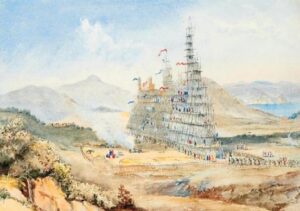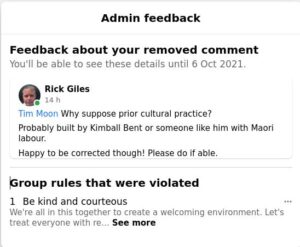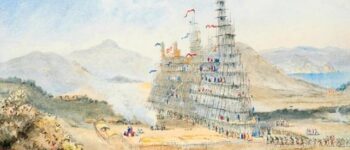1849: Feast at the Bay of Islands
September 23, 2021
By AHNZ

The greatest Maori hakari in history was probably the one in this picture. It was painted by the captain of the HMS Fly, Richard Aldworth Oliver in 1849. He had been visiting the Bay of Islands where the feast occurred. A hakari is a feast prepared for serving on layered platforms. It’s an ostentatious display of wealth and the ability to give which, not so long before 1849, must have been a great show of defeated and cooked foes to appreciate prior to a cannibal feast.
This one, as seems obvious, is well into the colonial period of New Zealand’s history. It was built by Maoris who had been colonised over the course of 30 years by this point using colonial technology and resources; Carpentry, sawn timber. This is 10 years into the Crown Colony time period. New Zealand was on its third Governor, second capital city, published numerous newspapers and its own government paper money. No Maori beating a tree with a stone could mill this much timber nor nail it together, nor apply the architectural knowledge to support such a high tower. Nor did the pre-colonial Maori decorate their structures with colorful flags.
These Maoris have adapted and absorbed Western technology into their way of life. They’re still on their own life path but have taken up new ways to make things bigger and better than their ancestors ever dreamed of being able to do. As much as this hakari is an example of colonised Maori it is also an example of Maori colonising.
“Hākari stages could be up to 30 metres high, and one was up to 2 miles (3.2 kilometres) long. These immense structures were part building, part scaffolding and part furnishing, using materials and artifacts from two cultures.” – The Great Māori Feast, Remuera, May 1844; Storymaps

Maoris would either have used a Pakeha Maori (Kimble Bent was a famous example) to perform this work or teach them how to do it too. I wasn’t going to post about this today at all, even after reading a post on the topic on the New Zealand Archaeology page on Facebook. Here it was claimed by Tim Moon and many others that this and other giant hakari were not colonial. Everyone who disagreed with that seems to have been expunged. I politely disagreed and asked for more information and even that comment has been deleted as a violation! How much New Zealand history is deleted this way and voices silenced by cancel culture? Not everyone has a history web page of their own they can use to put their Wrong Think on record as I do.
“Here are 2 remarkable images of Social Architecture witnessed by the author….These shift our perspective on Maori construction engineering. Anyone out there interested in reconstruction as a cultural art project I will support!” – Tim Moon
“Sorry~ you are missing something important. They were ‘observed’ in 1849; therefore represent prior cultural practice! They weren’t built for the White Man!” – ibid
“They built the Pyramid like structures because we are from IsraelTheir food were placed in a way to prevent rats from eating their sustenanceAs we know rats carried diseasesIf you know Maori historyOur Ratana Temple built in Ratana Pa Whanganui was built with no no no nailsThat’s what our Maori Architects were able to do without technology flash modern machineryNew Zealand should know what our builders managed without nails hammersA Great StoryOur Maori were brilliant” – Te Wharewaiata Webster
These conceits don’t just restrict themselves to a few dreamers on the internet or their plans to build the giant Bay of Islands hakari again. It has already been done…
“For the first time in 170 years, a large platform has been erected in Auckland under the supervision of Māori architect, Rau Hoskins. The platform was designed and built by Te Hononga Māori, the Māori architecture division at Unitec. The platform was designed on the traditional Māori banquet platforms employed by our ancestors on big events as a sign of hospitality.” – Traditional hākari platform constructed for Matariki, Te Karere, TVNZ (2013); Youtube
According to Scotty Morrison’s report Rau Hoskins, Jade Kake and a team of Maori architects from Te Hononga Māori, the Māori architecture division at Unitec, reconstructed the 1840s hakari for the first time in 170 years. This was done in 2013 at Silo Park, Wynyard Quarter, Viaduct Harbour, Auckland.
However, as the government TV coverage shows, the construction is dependent on the support of the massive steel viewing platform already built by Western technology. It appears that the Maori architects simply climbed the existing structure and lashed their own platform to it. That’s not how the 1840s builders did it.
Unless there’s much more to this report than made it to air it also appears that the architecture division of Unitec didn’t actually construct anything either. Despite their bold claims at re-creating one of the Great Wonders of New Zealand history, this seems to be bluster. All we see are 7 poles (bamboo?) tottering up against the steel platform in a parody of the great hakari.
Not much of a feast could be supported by Hoskins’ build. The fluro-vested and hard-hatted architects probably walked along the waterfront for some fancy Auckland coffees and designer sandwiches for the ‘feast’ after all this hard work. Who knows? Perhaps people have commented and recorded on this history too but it has had to be deleted and cancelled because it was disruptive to Right Think History?
—
Image ref. Feast at the Bay of Islands’, Richard Oliver (1849); Museum of New Zealand; ; Scootle.edu.au
Ref. Oliver, Richard Aldworth, 1811-1889, National Library NZ
 Like Comment Share
Like Comment Share





